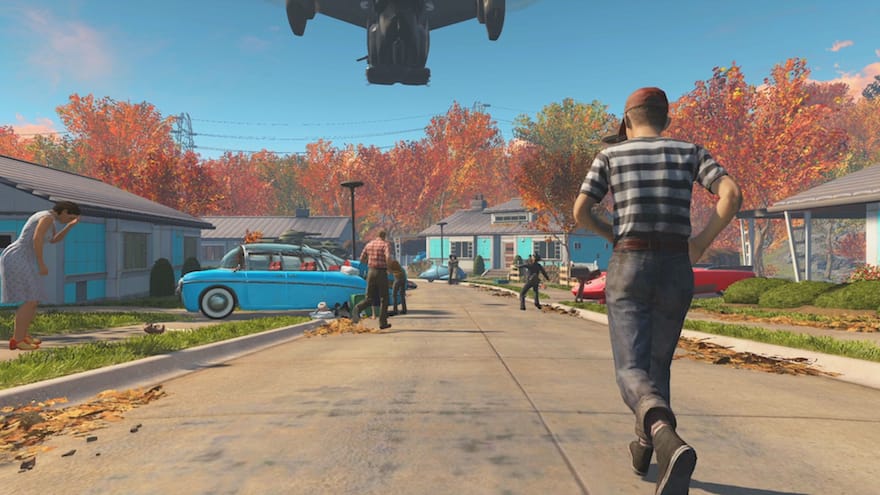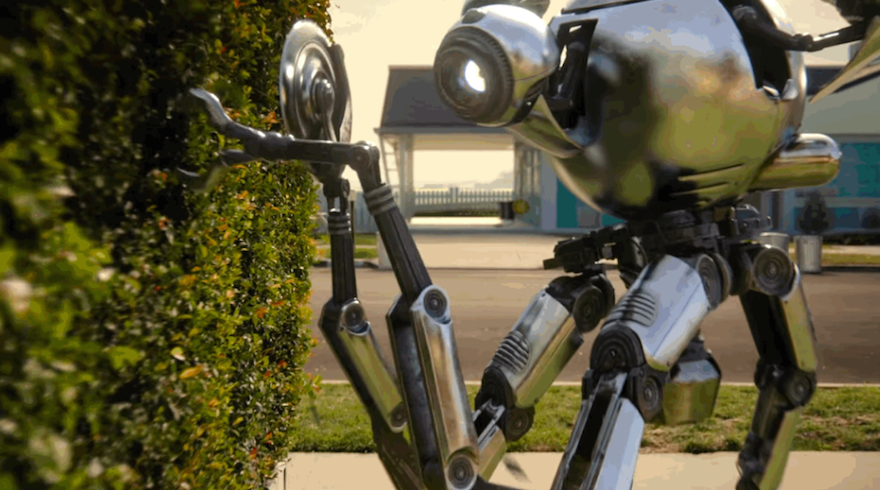Why Fallout 4’s 1950s satire falls flat

War may never change, but Kill Screen does. Back our Kickstarter to help support our print relaunch!
Fallout 4 takes us back. Back to the beginning. Back before the bombs fell, and before the world of the Fallout series took on its mutated, feral, apocalyptic form. But what did that world look like? The Fallout series has, since its inception, hinted at a world before nuclear annihilation that resembled, in its culture and its design, the 1950s, rather than the 2070s, which is the decade in which Fallout’s “Great War,” a two-hour series of nuclear blasts that decimated the planet, took place. But the series has only ever revealed this in the clues left behind in its various wastelands. That pre-war world, untouched by nuclear fallout, has never been shown, and because of this the series has always managed to uphold an ironic distance between the wastelands the player explores and the past these spaces gesture back to. But Fallout 4 is different; it begins before the bombs. And by allowing the player to be a part of this world, even briefly, this distance breaks down completely. Fallout 4 is the most nostalgic of the series, pining for its lost home and its lost world. You play as someone who lived and loved this old world, somebody who has an emotional attachment to it. But to get the player to feel the same is difficult, and the game doesn’t exactly reconcile this newfound sentiment with its irreverent tone. Fostering an emotional attachment to what has come before is not something that sits easily with the game’s satirical take on that previous world.
There is a marked difference as soon as the game’s introductory film begins. Previous games in the Fallout series have begun with a maudlin old tune from the ‘30’s, ‘40s or ‘50s, wailing away over a series of grainy images of a destroyed world. After the song ends, the monologue begins, with the videogame-famous intonation, “War. War never changes.” Fallout 4 changes this. For the first time, there is no song, and the opening monologue is spoken by the game’s playable male character. This does two things: firstly, it sidelines the female character, and presents the male as the default, intended protagonist of the game (an opening speech by both of them could have been interesting); and secondly, it creates a character before the player has had a chance to. Character creation has always been a key element of Fallout, with the playable character often being a blank state that players fill in for themselves. In the previous game, subtitled New Vegas, players are told the protagonist is a courier; apart from that, no other information is given. In Fallout 3, the game begins at the birth of the protagonist; in that game, the player is absent from no single moment of their life. This opening speech is much more revealing. The playable character is a former soldier. He speaks of his grandfather, of his wife, his child, of the shattering of the American dream. About the fear he feels. The game seems to be using this speech to pull the player in emotionally, to feel what the character feels, so that when the bombs start to fall, we understand what is at stake for this family.

Then the film ends, and the game opens up, and we are plunged into its pre-war world. On a sunny autumnal morning, somewhere in the suburbs surrounding Boston, the player is finally witness to the world before the bombs fell. The house we find ourselves inhabiting, in both its exterior design and its interior decoration, resembles a brand new home of the suburban 1950s; shiny new cars lay dormant outside each bright new house. The opening film has made it clear that the male playable character loves his family very much; it would make sense if this was shown and explored in this scene. It would make sense too for the wife to be given some characterization, for their relationship to be given some depth. But this doesn’t happen. The sequence gives the player no opportunity to engage in any meaningful way with either spouse or son. Instead, the game seems to utilize 1950s imagery as a visual shorthand; by presenting the traditional nuclear family in their comfortable suburban home, the game is telling the player to assume that they are happy and loving, rather than this being illustrated through in-game actions. This upends the stance previous games in the series took, in which the cultural mores of the 1950s, including the idea of the happy, suburban nuclear family, were plundered for satire. Being part of such a family, and feeling like an emotional attachment is meant to be made to them, sits uneasily with the game’s overall tone and sense of humour, and this is only heightened by the lack of effort the game makes in showing real relationships between these characters.
This begs the question, then: why the ‘50s?
This begs the question, then: why the ‘50s? Outside of the irony we as players are meant to perceive and enjoy, there is no reason why the culture of the Fallout world, in its music, its design and its fashion, is permanently stuck in the mid-twentieth century. We understand the inherent humour in the juxtaposition the game creates between its cosy ‘50s aesthetic and its hyperviolent imagery, but there is nothing in the world itself that justifies this, or at least expands on it. The series’ retrofuturism is its longest running joke, and by combining many different facets of ‘50s American culture, from naive technological optimism to the focus on the nuclear family and the beginnings of consumer capitalism, and coupling this with nuclear fallout on a planetary scale, the Fallout games have always carried with them an ironic commentary on the so-called “Atomic Age,” in which the power of nuclear energy was viewed as something that could change the world.
In the United States, the rise of nuclear energy came to a slowdown in the 1970s, and halted drastically after the Three Mile Island accident in 1979, when a nuclear meltdown took place in one of the two nuclear reactors in Dauphin County, Pennsylvania. After this, public support for nuclear power in the U.S. dropped significantly. Globally, the Chernobyl disaster of 1986 and the Fukushima Daiichi disaster of 2011 continue to fuel debate regarding the safety of nuclear power. But in the Fallout series, it is the harnessing of nuclear power that is key, both to its society’s technological advances, and its eventual self-destruction. The historian William Knoblauch writes of Fallout 3 that “the game’s reliance on 1950s imagery suggests that nuclear war was only ever really possible during the early Cold War. Put simply, Fallout 3’s apocalypse is born of a distant, but culturally familiar, 1950s era.” Maybe the answer to “Why the ‘50s?” is simply that without the ‘50s, Fallout wouldn’t be Fallout. Perhaps there is no other decade in which the cultural and political climate could be as severely juxtaposed with nuclear annihilation as that of the 1950s.

In many ways then, Fallout 4, like the rest of the series, is a satire of the 1950s and that decade’s dream of a science-fiction utopia. The wastelands of the series have always been strewn with the burnt-out remains of these dreams, yet because of the distance in time and in culture between the remains of the old world and the reality of the new, the kitsch ‘50s culture of the pre-war world always appeared ridiculous. By allowing the player to begin the game in that setting, and to play as someone who lived in that world, the game loses this distance from events, and therefore, so does the player. Being cast as somebody whose life is contained in the remains of the old world means that what before was considered ironic now has to be taken in with a very straight face. How is it possible to roleplay as anything but a parent pining for their child and for their home? But it’s still Fallout, and so this is perfectly possible. After hours spent wandering the wasteland, the memory of that brief stint in a past life will vanish, and all the leftovers of the old world will revert back to what they were in every other Fallout game: stuff to pick up. But maybe this is where Fallout 4’s settlements, in which the player can rebuild broken down towns and homes with junk assembled along their journey, will come in. Perhaps it can all be built back up, that image of the old world, and our son will be found, and that past life can begin again.



